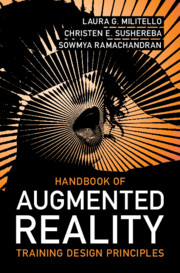Book contents
- Handbook of Augmented Reality Training Design Principles
- Handbook of Augmented Reality Training Design Principles
- Copyright page
- Dedication
- Contents
- Figures
- Tables
- Preface
- Acknowledgments
- Chapter 1 Introduction
- Chapter 2 Recognition Skills
- Chapter 3 Engagement
- Chapter 4 Scenario Building
- Chapter 5 Fidelity and Realism
- Chapter 6 Supporting Mental Model Construction
- Chapter 7 Scaffolding and Reflection
- Chapter 8 Synthesis
- Chapter 9 Conclusion
- References
- Index
Chapter 9 - Conclusion
Published online by Cambridge University Press: 18 May 2023
- Handbook of Augmented Reality Training Design Principles
- Handbook of Augmented Reality Training Design Principles
- Copyright page
- Dedication
- Contents
- Figures
- Tables
- Preface
- Acknowledgments
- Chapter 1 Introduction
- Chapter 2 Recognition Skills
- Chapter 3 Engagement
- Chapter 4 Scenario Building
- Chapter 5 Fidelity and Realism
- Chapter 6 Supporting Mental Model Construction
- Chapter 7 Scaffolding and Reflection
- Chapter 8 Synthesis
- Chapter 9 Conclusion
- References
- Index
Summary
This chapter revisits each of the design principles, summarizing and drawing connections between them. Many of the principles are based on empirical evidence from traditional learning environments; a discussion on the boundary conditions of the design principles explores the extrapolations of this evidence to training recognition skills in dynamic, high stakes environments. The chapter closes with a discussion of the contributions and challenges of augmented reality to training.
Keywords
- Type
- Chapter
- Information
- Handbook of Augmented Reality Training Design Principles , pp. 128 - 136Publisher: Cambridge University PressPrint publication year: 2023

